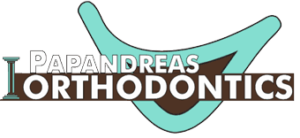Regardless of completed orthodontics and retainers your teeth will continue to shift. This is a normal occurrence forever and hence retainers are forever! Your retainers dramatically slow this process but can never completely stop it. Expect this shifting and even spaces appearing as time goes by especially in the presence of small teeth, a tight bite, clenching, grinding, and more. Proper use of your retainers is critical to slow these events dramatically down. Your retainers are custom designed with specific force applications to counter shifting and normal aging. Dr. Papandreas will continue to custom design your retainers for life. Please do not purchase retainers over the counter, from your dentist, or from the grocery store if you wish to maintain the best final possible results we have achieved.
WHEN TO WEAR YOUR RETAINER
- Wear your retainer immediately 24 hrs/day for the first 2 months, unless indicated otherwise by Dr. Papandreas. After this initial period, wear will be every night forever! Never wear the retainer less than every other night.
- Remove the retainer when drinking very hot/cold liquids, eating or playing sports as this will destroy the retainer.
- Do not take the retainer into restaurants, do not take it to the lunchroom; they will be lost!
- Be sure to bring your retainer at each and every visit to our office.
HOW TO CARE FOR YOUR RETAINER
- Firmly seat your retainer fully into position to ensure proper function; gentle removal will minimize damage.
- Rinse your mouth & retainer w/water after drinking & before re-inserting to minimize discoloration.
- When wearing full time every morning/night brush retainers w/toothpaste and rinse thoroughly to keep them clean.
- When wearing just to bed, rinse them every morning and then leave in a glass of clean water during the day. You may occasionally need to brush them w/toothpaste if you are not fully cleaning your teeth at bedtime!
- When away from home w/your retainer place in its case when not wearing to prevent breakage, loss.
- Don’t wrap the retainer in a napkin or tissue; you may accidentally throw it away.
- Minor adjustments may be made by carefully trimming plastic with a pair of small scissors or nail file.
WHAT TO EXPECT FROM YOUR RETAINER
- Sore teeth and gums, difficulty speaking, difficulty swallowing, and increased salivary flow may normally occur during the first week of wear but will then subside. If your braces were removed today, your gums may be inflamed from an inability to properly clean them during the braces. As a result, they may be red and bleed easily. Good brushing and flossing this week should make this subside.
- Residual gaps between teeth from your bands (silver rings) may persist after brace removal, good brushing and flossing will be particularly important in those areas.
- You will not be able to bite all the way down with the retainer in place, this is normal. Do not try to bite all the way down or you will break, dislodge and/or wear down the retainer.
- The retainer will not function properly if not worn completely in place!
- It is normal to see small pinholes develop in the retainer as you wear it. If multiple or large holes or tears begin to form though, you should contact our office.
- Like a great pair of dress shoes, retainers need to be replaced periodically due to wear. Average lifespan of a retainer is 2 years or more. Always call prior to the retainer being fully destroyed to minimize replacement costs.
- There is a charge to replace retainers.
Papandreas Orthodontics and the American Association of Orthodontists recommends a specialist evaluate all children no later than the age of 7. Although treatment rarely if ever begins at this age the early detection of impending problems will lead to a simpler future solution with proper timing. Dr. Papandreas provides the initial consultation with records and follow-up observations at no charge. Do not hesitate pursuing this evaluation regardless of the perception that ‘all is ok’ as many problems are not easily identifiable except by a certified orthodontic specialist. No referral is necessary.
DOWNLOAD A PDF COPY OF THIS GUIDE
Papandreas Orthodontics and the American Association of Orthodontists recommends a specialist evaluate every adult, and all children no later than the age of 7. Although treatment for kids rarely begins at age 7 the early detection of impending problems always leads to a simpler, less expensive future solution via proper timing. Dr. Papandreas provides the initial consultation with records and follow-up observations at no charge to all kids and adults. No referral is necessary for you or your child (you can also share this info with a friend); CLICK HERE to set a visit now. Do not hesitate pursuing this evaluation regardless of perception that ‘all is ok’, as many problems are not easily identifiable except by the Certified Orthodontic Specialist©.
